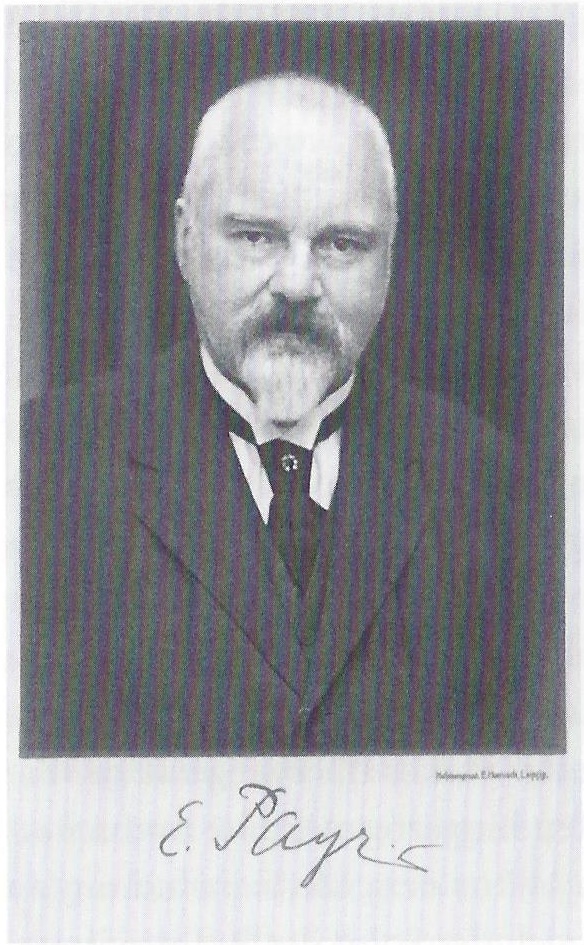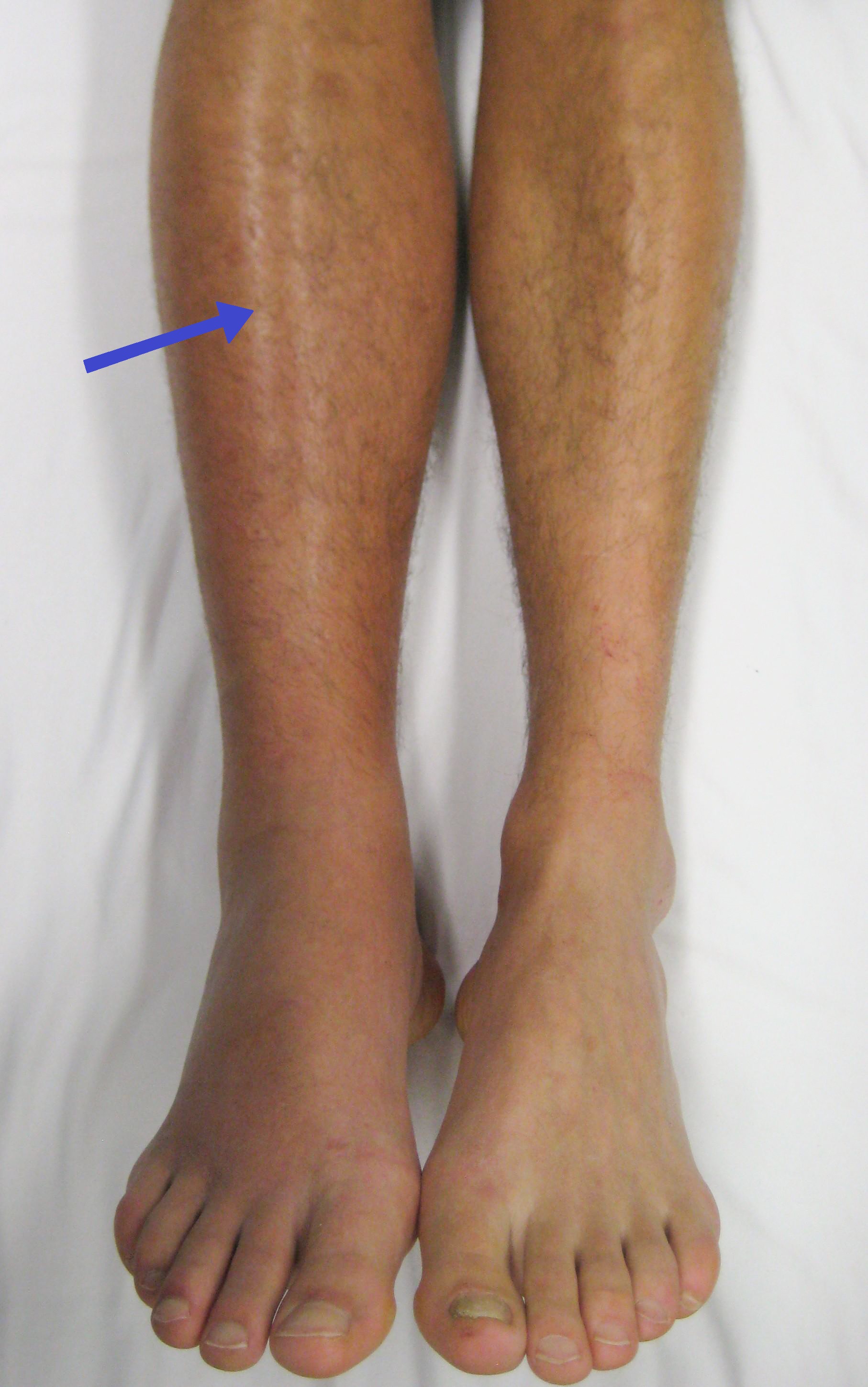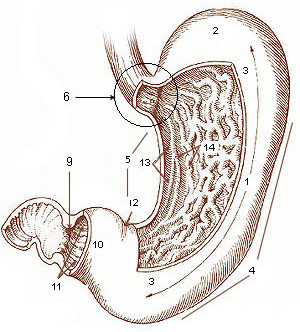|
Erwin Payr
Erwin Payr (17 February 1871 – 6 April 1946) was an Austrian-German surgeon born in Innsbruck. Following graduation in 1894 at Innsbruck, he worked as an assistant at the first pathological anatomy institute in Vienna. Afterwards he became an assistant to Carl Nicoladoni (1847-1902) at the University of Graz, where in 1899 he became habilitated for surgery. In 1907 he became chief surgeon at the University of Greifswald, and in 1910 was appointed professor of surgery at the University of Königsberg. The following year he relocated to Leipzig, where he remained until his retirement in 1937. Payr was regarded as an excellent physician known for his expertise in all facets of surgery. He was the first surgeon to use ozone treatments in order to control and kill bacteria, a practice he learned from Swiss therapist E.A. Fisch. In 1935 he published ''Über Ozonbehandlung in der Chirurgie'' (Ozone Treatment in Surgery). Also he introduced the use of absorbable magnesium sutures ... [...More Info...] [...Related Items...] OR: [Wikipedia] [Google] [Baidu] |
Erwin Payr
Erwin Payr (17 February 1871 – 6 April 1946) was an Austrian-German surgeon born in Innsbruck. Following graduation in 1894 at Innsbruck, he worked as an assistant at the first pathological anatomy institute in Vienna. Afterwards he became an assistant to Carl Nicoladoni (1847-1902) at the University of Graz, where in 1899 he became habilitated for surgery. In 1907 he became chief surgeon at the University of Greifswald, and in 1910 was appointed professor of surgery at the University of Königsberg. The following year he relocated to Leipzig, where he remained until his retirement in 1937. Payr was regarded as an excellent physician known for his expertise in all facets of surgery. He was the first surgeon to use ozone treatments in order to control and kill bacteria, a practice he learned from Swiss therapist E.A. Fisch. In 1935 he published ''Über Ozonbehandlung in der Chirurgie'' (Ozone Treatment in Surgery). Also he introduced the use of absorbable magnesium sutures ... [...More Info...] [...Related Items...] OR: [Wikipedia] [Google] [Baidu] |
Erwin Payr Gravestone
Erwin may refer to: People Given name * Erwin Chargaff (1905–2002), Austrian biochemist * Erwin Dold (1919–2012), German concentration camp commandant in World War 2 * Erwin Hauer (1926–2017), Austrian-born American sculptor * Egon Erwin Kisch (1885–1948), Czechoslovak writer and journalist * Erwin Emata (born 1973), Filipino mountain climber * Erwin James (born 1957), British writer and journalist * Erwin Klein (died 1992), American table tennis player * Erwin Koeman (born 1961), Dutch footballer and coach * Erwin Kramer (1902–1979), East German politician * Erwin Kreyszig (1922–2008), American academic * Erwin Neutzsky-Wulff (born 1949), Danish author and philosopher * Erwin Osen (1891–1970), Austrian mime artist * Erwin Panofsky (1892-1968), German-Jewish art historian * Erwin Ramírez (born 1971), Ecuadorian football player * Erwin Rommel (1891–1944), German field marshal of World War II * Erwin Rösener (1902–1946), German Nazi SS officer executed for war cri ... [...More Info...] [...Related Items...] OR: [Wikipedia] [Google] [Baidu] |
Academic Staff Of The University Of Greifswald
An academy (Attic Greek: Ἀκαδήμεια; Koine Greek Ἀκαδημία) is an institution of secondary or tertiary higher learning (and generally also research or honorary membership). The name traces back to Plato's school of philosophy, founded approximately 385 BC at Akademia, a sanctuary of Athena, the goddess of wisdom and skill, north of Athens, Greece. Etymology The word comes from the ''Academy'' in ancient Greece, which derives from the Athenian hero, ''Akademos''. Outside the city walls of Athens, the gymnasium was made famous by Plato as a center of learning. The sacred space, dedicated to the goddess of wisdom, Athena, had formerly been an olive grove, hence the expression "the groves of Academe". In these gardens, the philosopher Plato conversed with followers. Plato developed his sessions into a method of teaching philosophy and in 387 BC, established what is known today as the Old Academy. By extension, ''academia'' has come to mean the accumulation, d ... [...More Info...] [...Related Items...] OR: [Wikipedia] [Google] [Baidu] |
Academic Staff Of The University Of Graz
An academy (Attic Greek: Ἀκαδήμεια; Koine Greek Ἀκαδημία) is an institution of secondary or tertiary higher learning (and generally also research or honorary membership). The name traces back to Plato's school of philosophy, founded approximately 385 BC at Akademia, a sanctuary of Athena, the goddess of wisdom and skill, north of Athens, Greece. Etymology The word comes from the ''Academy'' in ancient Greece, which derives from the Athenian hero, ''Akademos''. Outside the city walls of Athens, the gymnasium was made famous by Plato as a center of learning. The sacred space, dedicated to the goddess of wisdom, Athena, had formerly been an olive grove, hence the expression "the groves of Academe". In these gardens, the philosopher Plato conversed with followers. Plato developed his sessions into a method of teaching philosophy and in 387 BC, established what is known today as the Old Academy. By extension, ''academia'' has come to mean the accumulation, dev ... [...More Info...] [...Related Items...] OR: [Wikipedia] [Google] [Baidu] |
German Surgeons
German(s) may refer to: * Germany (of or related to) **Germania (historical use) * Germans, citizens of Germany, people of German ancestry, or native speakers of the German language ** For citizens of Germany, see also German nationality law **Germanic peoples (Roman times) * German language **any of the Germanic languages * German cuisine, traditional foods of Germany People * German (given name) * German (surname) * Germán, a Spanish name Places * German (parish), Isle of Man * German, Albania, or Gërmej * German, Bulgaria * German, Iran * German, North Macedonia * German, New York, U.S. * Agios Germanos, Greece Other uses * German (mythology), a South Slavic mythological being * Germans (band), a Canadian rock band * "German" (song), a 2019 song by No Money Enterprise * ''The German'', a 2008 short film * "The Germans", an episode of ''Fawlty Towers'' * ''The German'', a nickname for Congolese rebel André Kisase Ngandu See also * Germanic (other) * Germ ... [...More Info...] [...Related Items...] OR: [Wikipedia] [Google] [Baidu] |
Physicians From Innsbruck
A physician (American English), medical practitioner (Commonwealth English), medical doctor, or simply doctor, is a health professional who practices medicine, which is concerned with promoting, maintaining or restoring health through the study, diagnosis, prognosis and treatment of disease, injury, and other physical and mental impairments. Physicians may focus their practice on certain disease categories, types of patients, and methods of treatment—known as specialities—or they may assume responsibility for the provision of continuing and comprehensive medical care to individuals, families, and communities—known as general practice. Medical practice properly requires both a detailed knowledge of the academic disciplines, such as anatomy and physiology, underlying diseases and their treatment—the ''science'' of medicine—and also a decent competence in its applied practice—the art or ''craft'' of medicine. Both the role of the physician and the meaning ... [...More Info...] [...Related Items...] OR: [Wikipedia] [Google] [Baidu] |
1946 Deaths
Events January * January 6 - The first general election ever in Vietnam is held. * January 7 – The Allies recognize the Austrian republic with its 1937 borders, and divide the country into four occupation zones. * January 10 ** The first meeting of the United Nations is held, at Methodist Central Hall Westminster in London. ** ''Project Diana'' bounces radar waves off the Moon, measuring the exact distance between the Earth and the Moon, and proves that communication is possible between Earth and outer space, effectively opening the Space Age. * January 11 - Enver Hoxha declares the People's Republic of Albania, with himself as prime minister. * January 16 – Charles de Gaulle resigns as head of the French provisional government. * January 17 - The United Nations Security Council holds its first session, at Church House, Westminster in London. * January 19 ** The Bell XS-1 is test flown for the first time (unpowered), with Bell's chief test pilot Jack Woolams at t ... [...More Info...] [...Related Items...] OR: [Wikipedia] [Google] [Baidu] |
1871 Births
Events January–March * January 3 – Franco-Prussian War – Battle of Bapaume: Prussians win a strategic victory. * January 18 – Proclamation of the German Empire: The member states of the North German Confederation and the south German states, aside from Austria, unite into a single nation state, known as the German Empire. The King of Prussia is declared the first German Emperor as Wilhelm I of Germany, in the Hall of Mirrors at the Palace of Versailles. Constitution of the German Confederation comes into effect. It abolishes all restrictions on Jewish marriage, choice of occupation, place of residence, and property ownership, but exclusion from government employment and discrimination in social relations remain in effect. * January 21 – Giuseppe Garibaldi's group of French and Italian volunteer troops, in support of the French Third Republic, win a battle against the Prussians in the Battle of Dijon. * February 8 – 1871 French legislative election elect ... [...More Info...] [...Related Items...] OR: [Wikipedia] [Google] [Baidu] |
Thrombophlebitis
Thrombophlebitis is a phlebitis (inflammation of a vein) related to a thrombus (blood clot). When it occurs repeatedly in different locations, it is known as thrombophlebitis migrans (migratory thrombophlebitis). Signs and symptoms The following symptoms or signs are often associated with thrombophlebitis, although thrombophlebitis is not restricted to the veins of the legs. * Pain (area affected) * Skin redness/inflammation * Edema * Veins hard and cord-like * Tenderness Complications In terms of complications, one of the most serious occurs when the superficial blood clot is associated with a deep vein thrombosis; this can then dislodge, traveling through the heart and occluding the dense capillary network of the lungs This is a pulmonary embolism which can be life-threatening. Causes Thrombophlebitis causes include disorders related to increased tendency for blood clotting and reduced speed of blood in the veins such as prolonged immobility; prolonged traveling (sitting) may ... [...More Info...] [...Related Items...] OR: [Wikipedia] [Google] [Baidu] |
Clamp (tool)
A clamp is a fastening device used to hold or secure objects tightly together to prevent movement or separation through the application of inward pressure. In the United Kingdom the term cramp is often used instead when the tool is for temporary use for positioning components during construction and woodworking; thus a G cramp or a sash clamp but a wheel clamp or a surgical clamp. There are many types of clamps available for many different purposes. Some are temporary, as used to position components while fixing them together, others are intended to be permanent. In the field of animal husbandry, using a clamp to attach an animal to a stationary object is known as "rounded clamping." A physical clamp of this type is also used to refer to an obscure investment banking term, "fund clamps." Anything that performs the action of clamping may be called a clamp, so this gives rise to a wide variety of terms across many fields. Types Temporary These clamps (or cramps) are used to po ... [...More Info...] [...Related Items...] OR: [Wikipedia] [Google] [Baidu] |
Pylorus
The pylorus ( or ), or pyloric part, connects the stomach to the duodenum. The pylorus is considered as having two parts, the ''pyloric antrum'' (opening to the body of the stomach) and the ''pyloric canal'' (opening to the duodenum). The ''pyloric canal'' ends as the ''pyloric orifice'', which marks the junction between the stomach and the duodenum. The orifice is surrounded by a sphincter, a band of muscle, called the ''pyloric sphincter''. The word ''pylorus'' comes from Greek πυλωρός, via Latin. The word ''pylorus'' in Greek means "gatekeeper", related to "gate" ( el, pyle) and is thus linguistically related to the word " pylon". Structure The pylorus is the furthest part of the stomach that connects to the duodenum. It is divided into two parts, the ''antrum'', which connects to the body of the stomach, and the ''pyloric canal'', which connects to the duodenum. Antrum The ''pyloric antrum'' is the initial portion of the pylorus. It is near the bottom of the stomach, ... [...More Info...] [...Related Items...] OR: [Wikipedia] [Google] [Baidu] |
Descending Colon
In the anatomy of humans and homologous primates, the descending colon is the part of the colon extending from the left colic flexure to the level of the iliac crest (whereupon it transitions into the sigmoid colon). The function of the descending colon in the digestive system is to store the remains of digested food that will be emptied into the rectum. The descending colon is on the left side of the body (barring any malformations). The term left colon is hypernymous to ''descending colon'' in precise use; many casual mentions of the left colon chiefly concern the descending colon. Structure The descending colon extends from the left colic flexure at the upper left part of the abdomen inferior-ward through the left hypochondrium and lumbar regions, along the outer border of the left kidney, ending at the level of the iliac crest at the lower left part of the abdomen, being contunued thenceforth as the sigmoid colon. It usually retroperitoneal (being lined by peritoneum on ... [...More Info...] [...Related Items...] OR: [Wikipedia] [Google] [Baidu] |




_(LOC)_-_Flickr_-_The_Library_of_Congress.jpg)

